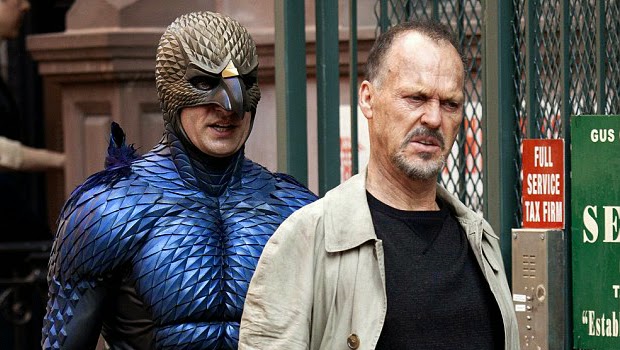For people with such a firm grab grasp on the English
language, writers are a bit rubbish at talking about themselves and their ideas. Pitching is
about 30% of the battle when it comes to getting your work off the ground
(along with 50% for the script itself, 15% for who you know and 5% of something
else, mostly for the sake of even mathematics). In those panic-ridden moments
where you find yourself having to pitch your latest project verbally, there's a
few key tips to keep in mind to avoid showering your conversation partner with
spoken diarrhea...
1) Judge If / When to Talk About Genre
Genre is the ultimate pitch shorthand, but I'd say that
about half of the time, it can do more harm than good. The trick is knowing
when to unleash the beast. With some genres, it pays to be completely upfront,
pretty much opening with what it is. These include any genre that revolve
around a setting (Western, War, etc.) or any genre that employs a specific tone
or style (Comedy, Horror, etc.). Feel free to qualify these with a single specific subgenre, for example a Psychological Horror, but know that
adding more subgenres actually says less about
what it is (e.g. a Neo-Noir Revenge Psychological
Horror Comedy) as the listener desperately tries to work out what the Hell
that all entails.
What I will say for the other genres that I have yet to
mention is that you need to ask yourself - is specifying the genre actually
adding anything? Saying something is a "Drama" literally means
nothing in this day and age. The genre should really be apparent from your
logline, or at least the two or three lines you use to summarise the darn
thing. If you know for a fact that it isn't, due to your narrative focus being
different to what would typically be expected (e.g. an Action movie that
focuses on a coming of age storyline), then use that as a twist within your pitch. Set
the listener up to believe it's one thing and then pull the rug out from
beneath them (not literally) when you reveal it's another.
2) Titles Can Make or
Break Your Pitch
Titles work in a similar way to genres, in that you should
avoid pitching them unless you're a) 100% certain you have the best title
possible, and b) it won't confuse what you've just pitched or are about to
pitch. If you're confident in it, lead with it - although if it happens to be a
comedy, beware of how your current audiences may react to puns. If you're less
confident, I'd recommend not mentioning it at all, unless directly asked. Even then though, if you admit to there being
a "working title", your listener's brain is going to immediately
conclude that you have no idea what you're actually doing, even if you've just
proven that isn't the case.
One thing I like to
do, which has worked in my favour most times, is to find a way to include the
title, whether it be a phrase or just a single word, within one of the
sentences of your pitch. That way, the title already feels strongly linked with
the end product. For instance, if your film was titled Guardians of the Galaxy, your opening of your pitch would be
something like "A band of five outlaws and misfits become wrapped up in a
plot threatening intergalactic security, and must join forces to become the Guardians of the Galaxy." You get
the idea. Note - you may struggle with this if your title is more avant garde
or a thematic symbol, but I'm sure you'll find a way.
3) Say as Little as
Possible
Have you ever stopped to wonder why someone has asked you about what you're working on? Could be
that they're simply making polite conversation after droning on about their
latest project for the last 20 minutes, but, if you're a glass half full kinda
person, it's more likely that they are genuinely interested in your ideas. Now
think back to your years in education - weren't the sessions where you were
actively encouraged to participate and answer questions far more engaging than
the lectures where the teacher would talk solidly for a full hour? Your pitch
needs to be interactive and the best
way to do this is to leave threads dangling.
I'm not advocating that you basically ignore the opportunity
to pitch here. I'm reinforcing what we already know - that brevity is crucial. Pitch
your entire film in a single sentence, that includes a) your main character(s),
b) their ultimate goal and c) the main thing that is preventing them from
achieving said goal. If you've done your job right, your "listener"
will maybe ask a question or two (e.g. "Why is the main character depressed?", "Why do they want to become the Prime Minister of Canada?",
"How are they going to overcome the hoard of Probing Aliens camped between
them and Mr. T's penthouse?"). Be prepared for these questions, and answer
them in a single sentence. You don't
want your audience to feel like they're working too hard though, so be sure to
always LAD... Leave A Dangler.
4) Mention Other
Films at Your Own Peril
"It's like Who
Framed Roger Rabbit meets Braveheart".
What does the even MEAN? In your mind, you've borrowed elements from two
different "beloved" movies and created your own. But in that one
sentence, there's no indication as to what elements they even are, and so now
your audience is scratching their heads trying to work out whether you mean
it's a Comedic Noir set in the Scottish Highlands or if it's a blend of live
action and animation where fictitious characters team up with William Wallace
to overcome... something?! You can maybe get away with this IF your single
logline sentence was already super clear as to what you're trying to achieve.
But then you run into a different problem - what if your
audience doesn't like either or ANY
of the films you've just mentioned. Sure, in a professional context, they would
try to remain objective, but there's no doubt that their preconceptions over
the quality of those films won't weigh on them subconsciously. And now, worst
of all, your audience is thinking about someone else's work and not your own. Keep
your pitch focused on your story
entirely, and if your listener happens to draw those comparisons for themselves
then that's absolutely fine - at least they've engaged and understood what
you're saying rather than trying to decipher some cryptic riddles.
5) Don't Think About
It as a Pitch
I'm aware this goes against pretty much everything you just
read (unless you skipped to the end, you Cheating Charlie), but this is
probably the most important tip of them all. The way you can achieve this is
simple, but involves a little dedication on your part. Memorise your one
sentence logline, to the point where you don't sound like a 5 year old in a
school nativity play, but that it comes out naturally like breathing itself.
You want to be reeling that thing off in your sleep. Now, whenever someone asks
you to talk about your movie, it's nothing more than just flexing a muscle. You
can focus on the important stuff, like developing a rapport with your listener
beforehand, making it feel more like a casual conversation.
Obviously, you don't want to sound blasé though, as the
thing that will kill your project fastest is a lack of passion. Think about the
three major pointers in your sentence as you're memorising it, and put the
right amount of emphasis on the character, the goal and the obstacle. Make the
character sound unique, make the goal seem out of their reach and, most of all,
make what's stopping them even greater. At this point, it isn't a pitch any
more whenever you have to reel off that sentence. You've said it about 500
times to your terrifying dog, so a guy in an elevator isn't going to be much of
a threat. The main thing is, you've managed to think big but keep it small, and
that's what anybody who is listening is going to appreciate most.
James Cottle, after
studying Scriptwriting for 4 years, is now an embittered real life freelance
writer, and seeks to unlearn everything he knows. But he needs your help...
Follow him on Twitter @Jxmxsc and share this blog to help spread his anarchic
plight for reform amongst the writing masses.







































